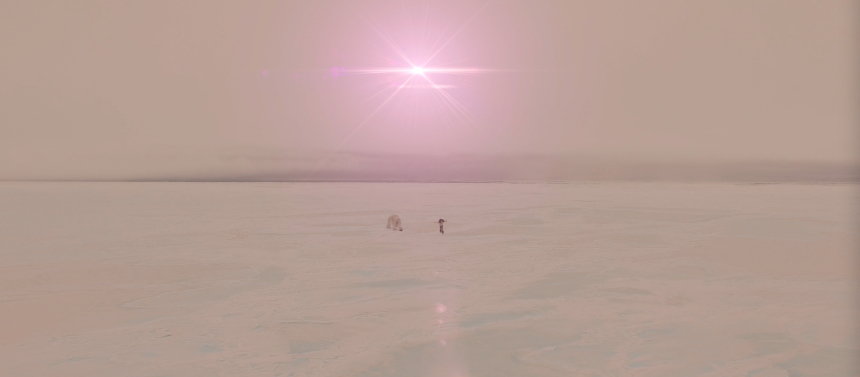Fantasia 2022 Review: POLARIS, A Gritty Bit of Original Myth-Making

There is magic at play in Kirsten Carthew's Polaris. It is set the year 2144. Earth has been ravaged and sent back to another ice age, one where the fish bleed green blood. Pockets of survivors eke out a violent and brutal existence in the perpetual frozen wasteland, armed with bows, axes and junked-up snow machines. And then there is Sumi, a feral young woman who hunts and gathers in harmony with a polar bear, more at home with the trees and the silence. She is introduced gleefully frolicking in the snow alongside her ‘mother’ in a post-apocalyptic paradise.
That paradise is shattered when Sumi comes into contact with the local tribe of marauders, who steel her from her mother and put her in a cage. Polaris is not a story of a momma bear rescuing her cub, but rather a resourceful cub finding her way in the world. Sumi’s journey to reunite with her mother is a coming of age tale elevated by a large arctic canvas (and a filmmaker who knows out to use it) into its own kind of visual folklore. Sumi is wily, resourceful, and constantly underestimated by her enemies. She bears witness to both the good and the bad in humanity. She evolves into something beyond them; a story to be told to future generations.
This is shoot-for-the-stars filmmaking, often literally, with its eponymous orb guiding Sumi to her eventual destination. In true show-don’t-tell fashion, the story is told almost entirely without dialogue. While the marauders have a kind of guttural communication, Sumi does not understand it, and it is not subtitled for us, the audience. Mostly they speak in war, which is easier to understand. Another character, a frozen girl that Sumi rescues and resurrects, speaks in a kind of lyrical sing-song dialect which is obviously a differently language, but equally unknown to us. A harmonica in the hands, and at the lips, of a tough old woman who peddles gasoline (and dresses a wee bit like Immortan Joe from Fury Road) does more for communication than words can in this world.
This is shoot-for-the-stars filmmaking, often literally, with its eponymous orb guiding Sumi to her eventual destination. In true show-don’t-tell fashion, the story is told almost entirely without dialogue. While the marauders have a kind of guttural communication, Sumi does not understand it, and it is not subtitled for us, the audience. Mostly they speak in war, which is easier to understand. Another character, a frozen girl that Sumi rescues and resurrects, speaks in a kind of lyrical sing-song dialect which is obviously a differently language, but equally unknown to us. A harmonica in the hands, and at the lips, of a tough old woman who peddles gasoline (and dresses a wee bit like Immortan Joe from Fury Road) does more for communication than words can in this world.
Shot on a very modest budget in Canada’s Yukon, the film still manages to feel vast and vital. Visual effects are used sparingly, letting the natural world do most of the heavy lifting. Young Viva Lee portrays Sumi as both a resilient survivor and blank-slate innocent. Hers is a guttural, physical performance, where she bares her teeth a lot - in a warning or a smile. Despite the action and the thick hides to ward off the cold, her performance is very much played across her face, even when it is partially covered in a strip of cloth.
Polaris is a movie of many meetings, many of them bloody and violent, some warm and intimate, with Sumi always the chief witness. We are invited to view all events through her eyes, even as we are unsure of what she is; or what she will become. She has powers and abilities that neither we nor her completely understand, be it speaking to the trees that mystically bend towards her, or healing with glowing hands. Carthew often eschews clean point A to point B storytelling in favour of the poetic. The film wants you to accept its mysteries, and the geography, of its harsh world without explanation. It wants to you feel the birth of mythology. It does so with more than a little grit.

Do you feel this content is inappropriate or infringes upon your rights? Click here to report it, or see our DMCA policy.






